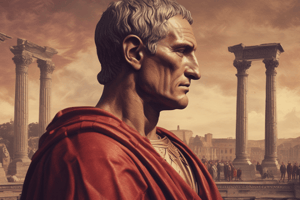Podcast
Questions and Answers
What was the political structure of Rome when Julius Caesar was born?
What was the political structure of Rome when Julius Caesar was born?
- Monarchy
- Oligarchy
- Dictatorship
- Republic (correct)
Which leaders did Julius Caesar befriend to influence the Roman government?
Which leaders did Julius Caesar befriend to influence the Roman government?
- Pompey and Crassus (correct)
- Cicero and Sulla
- Octavian and Lepidus
- Brutus and Mark Antony
What region did Julius Caesar become the leader of after his military service?
What region did Julius Caesar become the leader of after his military service?
- Egypt
- Asia Minor
- Gaul (correct)
- Britain
What serious decision did Caesar face at the Rubicon River?
What serious decision did Caesar face at the Rubicon River?
What phrase is derived from Caesar's decision at the Rubicon River?
What phrase is derived from Caesar's decision at the Rubicon River?
Study Notes
Julius Caesar's Early Life
- Born in 100 BCE to a wealthy Roman family.
- From a prominent line of Roman citizens; family name "Caesar" would become synonymous with "all-powerful ruler."
Roman Republic Context
- Rome was a republic, a form of democratic government during Caesar's birth.
- Many Romans faced poverty; dissatisfaction with leadership was widespread.
Military and Political Rise
- After military service, Caesar entered politics and formed alliances with Pompey and Crassus.
- Together, they influenced Roman government significantly.
Leadership in Gaul
- Caesar was assigned as leader of Gaul, a war-torn region, where he successfully raised an army.
- His military victories made Gaul safer and significantly increased his popularity and power.
Conflict with Pompey
- Caesar's growing influence caused tension with Pompey, who sought to limit his power.
- Their relationship deteriorated into rivalry and enmity.
Crossing the Rubicon
- In 49 BCE, Pompey demanded Caesar disband his army and return to Rome, suspecting a trap.
- Caesar made the pivotal decision to lead his army across the Rubicon River, marking a point of no return.
- The phrase "crossing the Rubicon" now signifies a point of irreversible commitment.
Studying That Suits You
Use AI to generate personalized quizzes and flashcards to suit your learning preferences.
Description
Explore the early life of Julius Caesar, born in 100 BCE to a wealthy Roman family. Learn about the socio-political context of the Roman Republic and how it shaped his future as a powerful ruler. This quiz covers key events and figures in his formative years.



